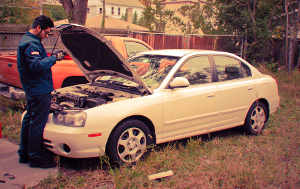Do medical conditions have to be declared for car insurance?

Having certain medical conditions doesn’t necessarily mean you can’t drive but they can impact your ability to drive, plus they can increase the risk to you, your passengers and others on the road.
If you have had a change in your medical status through an accident or diagnosis, it is important to make sure that both the DVLA and your insurance provider have been notified before you continue to drive.
Keep reading to find out what those conditions may be and who you need to tell before getting your vehicle insured.
Are there driving restrictions for people with medical conditions?
Sometimes, after informing the DVLA of changes to your medical condition, your licence type may change depending on the government’s fitness to drive criteria.
After accessing your disability or medical condition, the DVLA has the right to decide:
Whether your car’s design needs adapting or any modifications
Whether you need to change your driving licence or get a new one
Whether you need a shorter licence (for 1, 2, 3 or 5 years)
Whether you should give up your licence and not drive
In some cases, a medically restricted driving licence will be issued to you.
What is a restricted licence?
When driving with a medical condition, you may need a restricted licence. It is still a functioning driving licence that proves you are eligible to drive on UK roads, the only difference is, after an agreed-upon time period has passed, you will need to have a medical review to renew your licence.
These licences can last for one, two, three or five years and, although not always the case, this can sometimes result in higher insurance premiums.
Which medical conditions should I declare?
You should disclose any existing, new or developing medical conditions that could impact your ability to maintain full control and focus while driving.
Disclosing is important for preventing the invalidation of your licence and insurance due to incorrect information, but it does not necessarily mean that you will be prevented from driving.
For example, if poor eyesight is the issue, the requirement could be as simple as the driver wearing glasses when in control of a vehicle. In other cases, such as conditions affecting limbs, your car may require modifications before it is considered safe to be on the road again.
If your condition means you are unable to drive for three months or more, you may be asked to surrender your licence until you have passed a medical to demonstrate you are in a suitable condition to resume driving.
Examples of common conditions that should be disclosed include:
Visual conditions
Eyesight deteriorates as you get older, which means it is important to have your eyes tested regularly. If you experience severe changes, including double vision or light sensitivity, consult your doctor and discuss the implications for driving.
Sleep apnea
If you suffer from severe or regular sleep apnea, you should disclose it immediately. Mild sleep apnea or fainting spells without excessive sleepiness may not need to be disclosed, but this should be confirmed with your doctor. If you are in any doubt then declare your condition.

Image source: Adobe Stock
Epilepsy
Epileptic seizures can be difficult to anticipate but having one behind the wheel could cause a serious accident. If you suffer from epilepsy, you must declare it and will likely be assessed regularly by the DVLA to confirm you’re still safe to drive.
Strokes
Strokes often result in a short-term restriction from driving. As you recover you should not drive for one month and then only begin again once your doctor has conducted a health check.
Neurological conditions
Conditions such as Parkinson’s and Alzheimer’s get worse over time. If you have one of these conditions, you will likely be assessed annually to ensure you are still able to drive safely.
Physical disabilities can be wide-reaching and vary greatly from person to person. If you require modifications such as steering aids or hand controls, you will need to declare these to your insurance company.

Image source: Adobe Stock
Surgery
If you had a hip or knee replacement you should follow the procedures for limb disability.
The DVLA should be notified if you have had a significant operation which could prevent you from driving three months later, such as a caesarean section.
You can notify the DVLA by completing the relevant forms, which can be found, along with a full list of medical conditions, on the DVLA website. If in doubt, it is best to disclose any changes or new conditions.
Exceptions
A notable exception is for hearing-related conditions – there is currently no restriction for hearing impaired drivers.
Controllable diabetes is also unlikely to affect your car insurance unless you require insulin. In this case, the driver would be issued a restricted licence.
Who do I have to disclose my medical condition to?
Changes to your medical condition must be disclosed to both the DVLA and your insurance company.
A valid licence is required to take out an insurance policy and so failure to disclose a change in condition could result in your insurance claim being invalidated if you were to be involved in an accident.

Image source: Adobe Stock
Are there any conditions which will prevent me from driving?
Decisions on allowing people to drive with medical conditions are made on a case-by-case basis by the DVLA. This could mean having a medical assessment with a doctor to determine if it is safe for you to return to the road. The decision should take around six weeks and you are allowed to continue driving in the interim.
Depending on the results of your assessments, the DVLA may require you to surrender your licence if you are going to be unable to drive for a sustained period (over three months). At this point another assessment would determine whether your licence is returned, revoked or limited. This process can be appealed.
What happens when you don’t declare your medical condition?
Not declaring an illness could result in your insurance policy being invalid should you try to claim. If you have not confirmed with the DVLA that you are still considered fit to drive following a change in health conditions, you could have your licence revoked or face a fine of up to £1,000.
Will my insurance premium increase?
Under the Equalities Act 2010, insurers cannot refuse coverage, raise premiums or increase an excess based on a driver’s medical condition if it was declared when the DVLA issued your licence. The only exception is if there is evidence of an increased risk e.g. as the condition changes over time.
Insurers are permitted to request evidence and information regarding your medical condition and are allowed to increase premiums if they believe that the chances of your causing an accident have increased. However, they must inform you of their reasons.
Driving an adapted vehicle could result in increased insurance premiums due to the potential for additional repair costs. If you require insurance for adapted vehicles speak to a disabled driver insurance specialist, to get a policy that is right for your needs.
How can Adrian Flux help?
Not sure how to get an insurance deal that’s truly fair for disabled drivers? Adrian Flux will work with you, no matter what condition you have, to make sure you are heard and can find a disabled driver insurance deal that suits you.
Call 0800 369 8590 for a quick and easy quote or book a callback at a time that suits you.





